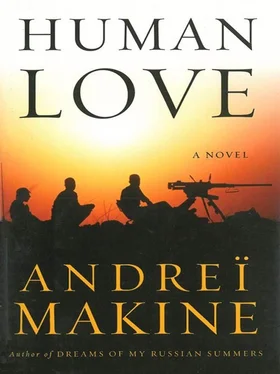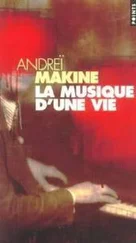Another sign, the impeccably dialectical slanging match between Joâo Alves, now a minister, and an army sergeant, unable to resolve which of them should end up with a fine car that had been smuggled into the port of Luanda.
But perhaps revolutions die when people begin going to visit them like private viewings at galleries. That tall Belgian woman, his fathers girlfriend in Kivu. Louise Rimens, going to Havana as a revolutionary tourist. And now these armchair viewers of the march of history, the Europeans he encountered in Luanda.
In the month of May he forgot about these tiny indications that the revolutionary ideal was flagging. A popular uprising against the MPLA erupted. President Neto suppressed it in a bloodbath. This crackdown on “faction-alists” did away with a number of Elias’s friends. “The death knell sounds,” he told himself, “when revolutionaries start killing one another,” and he was by no means certain of his own survival. His control, who dealt with the Soviet secret service, broke off all contact. Moscow was waiting to see how far the repression would go: should its agent be rescued from the Angolan quagmire, or should he be sacrificed?
Elias was spared. “Young but promising,” he quipped bitterly. The Soviets renewed contact and gave him a new mission: to gain authorization to be present at the interrogation of the “factionalists.” He succeeded. In one cell he saw a woman lying unconscious. Beneath her torn dress broken ribs stuck out.
He recalled that President Neto wrote poetry.
In 1978 Elias formed a part of the Angolan delegation that accompanied Neto to Zaire. This visit to Mobutu by the Marxist president infuriated the Kremlin. Doubtless the countdown had now begun for Agostinho Neto, the poet, Elias thought. An odd journey, in the course of which Elias noted with astonishment that the soldiers polishing Marshal Mobutu’s car were using French eau de toilette in spray form to clean the hubcaps.
In May 1979 he again went to Kinshasa with a team that was to prepare for the new Neto-Mobutu summit. It was there that he learned of the arrest of Antonio Carvalho, the vet from Dondo who had made him read Marx. The man had now retired to the north of the country, playing no part in politics. But the hunt for “factionalists” had a need to unmask enemies everywhere.
Elias left Kinshasa by car, traveling via Kikwit, hoping to reach Lunda Norte the following day. He was held at the frontier, not by the Zairean guards but by the Angolan rebel soldiers of UNITA. All things considered, the cruel tortures they inflicted were futile because the truth they were trying to extract from him was hard to admit: as one of Netos men, he was entering Lunda Norte to rescue someone Neto was going to kill.
They threw him into a wattle-and-daub hut and left him without water for a day and a half. He lost consciousness several times and came to during the second night, when through the mists of his pain he heard whispering in a language he knew. He made an effort to prise open his eyelids, saw two shadows moving in the darkness. Two men the soldiers had recently impounded in this prison with crumbling walls. A dull voice muttered curses directed at the UNITA soldiers, then modulated into snoring. A different, younger one, suddenly murmured very distinctly; “I want to die another way, not like this African…” In Russian.
THE YOUNG PRISONER WAS AFRAID; Elias sensed his panic in the darkness. He was moved by this anxiety on the part of a foreigner, possibly on his first visit to Africa. He would have liked to reassure him, speak to him about an exchange of prisoners such as the UNITA military must have in mind, otherwise they would have killed all three of them – along with the peasants they had just shot. He did not have the strength to say it, or even to make a sign to the Russian. His hands and feet were bound with wire that cut into his skin. But the will to assist the other man helped him to remain on the alert himself.
The soldiers’ voices reached them through the un-glazed window. He realized they were engaged in raping a woman, that fat Zairean woman with a very childish, chubby face whom he had noticed just before being thrown into this “prison” hut… The young Russian stood up to peer at what was happening outside. One of the soldiers must have seen him; the door opened, and thick boots began kicking, somewhat blindly, at the three bodies lying there. The young man shielded his head like a boxer on the ropes. His older comrade knew how to absorb the blows by means of abrupt, muscular swerves of his trained body
Elias pictured the impression this must be making on the young prisoner, who kept whispering a mixture of curses and lamentations at intervals in the darkness. He probably perceived a world cleanly divided into the bastards, these UNITA brutes, who raped and killed and sold themselves to the Americans, and the heroes, or at least people of goodwill, struggling to guide Africa along the prescribed path of history Yes, a clear and well-defined perception of this kind. Tempting clarity…
Such a world, neatly cut in two, did not exist, Ellas knew well. This night alone was an inextricable tangle of lives, deaths, words, desires, abysses. There was that woman with her childlike face and her heavy, fleshy buttocks, whom the soldiers were taking it in turns to violate. By diverting their aggression, this rape had very likely saved the three prisoners from being executed. Anyone skilled at telling fortunes would have shown that their survival depended simply on the pleasure offered by the buttocks of a woman on all fours beneath the soft light of the moon. And on the same night, in the town Elias had failed to reach, an old man, the vet, Carvalho, was being tortured to death. And on the beaten earth floor of a hut there lay this tall African (me, he thought in surprise), a virtual corpse, in fact, its wounds swarming with insects. In his youth this African had seen a man stretched out in a prison courtyard under a blazing sun, whose body presented more or less the same fly-infested wounds. The boy had made a silent vow then to fight against this world where a man could be transformed by his fellow human beings into such verminous flesh. The boy had grown up and fought, and now this echo of the past was so cruelly droll as to make him smile, in spite of the pain.
Men invoke history, politics, morality… This allows them to explain everything, he thought. The leader of UNITA, the wicked Jonas Savimbi, is supported by the wicked Marshal Mobutu, who is supported by the wicked American imperialists. And the MPLAs good president Agostinho Neto, supported by Moscow, is fighting these terrible people so that the ideals of fraternity may triumph. How clear it all is!
Elias opened his eyes: amid the stifling density of the night that drunken child was putting his head through the window frame from outside and threatening the prisoners with a submachine gun. He was capable of squeezing the trigger for sport or in a simple muscular twitch. His face was rigged out in a gas mask with a torn-off tube. The glass was broken, and his misty, drugged eyes appeared now full of hate, now languid, like those of a sick child. For men who liked clarity, this gaze did not exist.
Just as this Africans racing thoughts did not exist (me, Ellas again reflected in amazement, and felt detached from his body covered in bleeding wounds, from the voice that was still alert within him). Two months earlier, that encounter at a diplomatic shindig in Lusaka. Anna with her husband, who now held a post at the Soviet embassy. A young woman very much at her ease amid the absurd exchanges of social chitchat. More beautiful than before, more radiant. And her Vadim, who still had a slight stoop, a mild myopic air. Avoiding them had not been difficult…
The child appeared at the window again, aimed the gun, waved it. Shoot! Go ahead, shoot! Elias caught himself thinking, and was angry with himself for this weakness. But nevertheless the picture crossed his mind: a burst of gunfire, a moment of pain, that puts an end to the long-drawn-out pain of a day and a half, erases Annas face, whose newfound beauty is a betrayal of the face he loves. And after that burst, nothingness, which can only be the fragrance of the snow in the folds of a gray woolen dress…
Читать дальше









